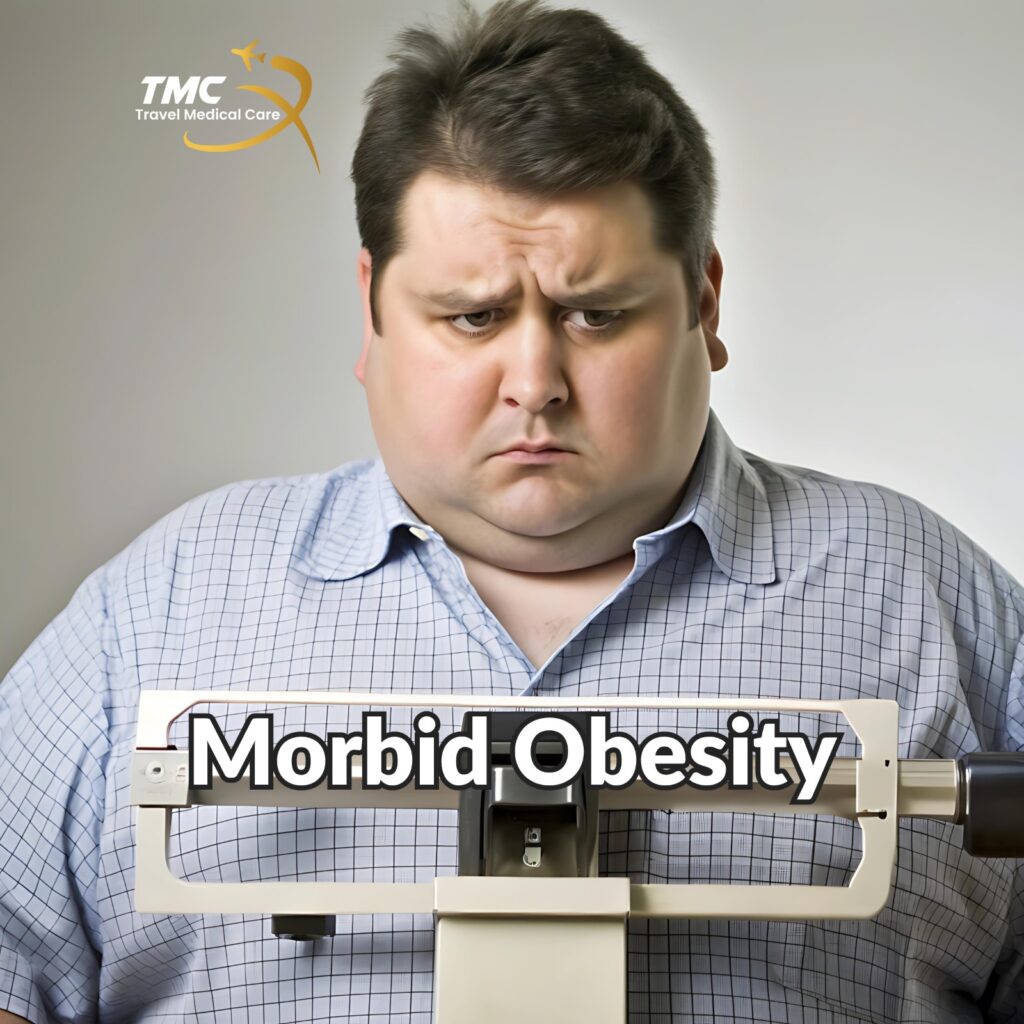In a world where time is racing and daily pressures are ever-mounting, morbid obesity stands as an invisible barrier between you and a life filled with energy and health. It’s not just a number on the scale, but a story told by every cell in your body a silent battle with habits, emotions, and circumstances. This journey demands the courage to wake up, make a decision, and commit to a transformation that’s not just external, but deeply internal as well.

However, the true challenge lies not in starting the journey, but in choosing a companion who can light your path and walk every step with you in confidence and professionalism. Here begins a new chapter with TMC, a company that combines the latest medical technologies with comprehensive psychological support to restore not only your ideal weight, but your strength and self-respect. Every step you take today is an investment in a brighter tomorrow where your health becomes a success story worth sharing.
What Is Morbid Obesity: Definitions and Measurements
Definition of Morbid Obesity
Morbid obesity is a chronic medical condition characterized by an excessive and abnormal accumulation of fat in the body. It goes beyond simple overweight status and directly impacts the health of vital organs such as the heart, lungs, liver, and kidneys. It is a complex disease influenced by genetic, behavioral, and environmental factors, making it one of the most pressing health challenges of our time.
Measurement Standards for Morbid Obesity
- Body Mass Index (BMI): A standard formula used to assess weight in relation to height:
BMI = weight (kg) ÷ (height (m))²
- 18.5–24.9: Normal weight
- 25–29.9: Overweight
- 30–34.9: Obesity Class I
- 35–39.9: Morbid Obesity (Class II)
- ≥ 40: Severe Morbid Obesity (Class III)
- 18.5–24.9: Normal weight
- Waist Circumference: An important indicator of visceral fat, which is associated with serious health risks. A waist measurement over 102 cm in men and 88 cm in women indicates a higher risk of heart disease and diabetes.
- Body Fat Percentage: Measured using advanced tools like DEXA or bioelectrical impedance analysis. It provides a precise evaluation of fat distribution to aid in accurate diagnosis.
Causes and Contributing Factors of Morbid Obesity
Genetic and Biological Factors
Studies suggest that genetics influence up to 40–70% of how the body metabolizes food and stores fat. This explains why some people are more prone to obesity. Hormones such as leptin and ghrelin also play key roles in regulating hunger and metabolism.
Hormonal disorders like hypothyroidism, high cortisol levels (Cushing’s syndrome), and polycystic ovary syndrome can disrupt weight regulation and make weight loss more difficult.
Behavioral and Environmental Factors
Lack of physical activity is a major cause of obesity. Modern sedentary lifestyles, combined with calorie-rich diets high in saturated fats and refined sugars, promote fat accumulation.
Irregular sleep disrupts hunger hormones and increases appetite, leading to overeating.
Psychological and Social Factors
Stress, anxiety, and depression contribute significantly to emotional eating and weight gain. Social isolation and lack of emotional support further worsen the condition and complicate weight management.
Medical Factors
Certain medications, like antipsychotics and corticosteroids, can lead to weight gain. Chronic diseases affecting the endocrine system can alter metabolism, making it easier to gain weight.
Health and Social Impacts of Morbid Obesity
Health Effects
- Cardiovascular Disease: Elevated fat levels and high blood pressure increase the risk of atherosclerosis, angina, and heart attacks.
- Type 2 Diabetes: Insulin resistance linked to obesity raises blood sugar levels.
- Breathing Problems: Obesity contributes to sleep apnea and respiratory issues, affecting sleep quality and causing fatigue.
- Joint and Bone Problems: Excess weight places strain on joints, leading to osteoarthritis, particularly in the knees and hips.
- Fatty Liver Disease: Fat accumulation in the liver may lead to inflammation and fibrosis.
- Increased Cancer Risk: Higher risk of cancers such as breast, colon, and kidney cancer.
Psychological and Social Effects
- Poor self-esteem due to negative body image.
- Exposure to ridicule or bullying, leading to depression and social withdrawal.
- Reduced quality of social and professional life due to fatigue, limited mobility, and poor physical performance.
Comprehensive Diagnosis of Morbid Obesity
- Physical Examination: Includes weight and height measurements to calculate BMI and waist circumference.
- Lab Tests: Blood tests to assess liver and kidney function, hormone levels (thyroid, insulin, sex hormones), glucose, and lipid profiles.
- Additional Tests: ECG to assess heart health, sleep studies if sleep apnea is suspected.
- Psychological and Nutritional Assessment: Sessions with a dietitian and psychologist to understand eating behaviors and mental health status.
Treatment Strategies for Morbid Obesity
Lifestyle Changes
- Diet: A low-calorie, balanced diet rich in vegetables, fruits, and lean proteins. Avoiding sugars and saturated fats is essential.
- Physical Activity: At least 150 minutes of moderate exercise weekly (e.g., brisk walking, swimming, cycling).
- Psychological and Behavioral Support: Cognitive behavioral therapy (CBT) to help patients change eating habits and manage emotional eating.
Medication
Certain drugs can help suppress appetite or reduce fat absorption, such as Orlistat, under medical supervision to manage side effects.
Surgical Treatments
- Gastric Sleeve Surgery: Removes 70–80% of the stomach, leaving a tube-like structure. It lowers food intake and reduces the hunger hormone (ghrelin), leading to sustained weight loss.
- Gastric Bypass: Reduces stomach size and reroutes the digestive system to decrease calorie and fat absorption especially effective in managing diabetes.
- Gastric Balloon: A temporary silicone balloon is inserted into the stomach for 6 months to create fullness and reduce food intake non-surgical.
- Smart Capsule: A swallowable capsule that inflates in the stomach for 4 months to curb appetite minimally invasive.
- Adjustable Gastric Band: A silicone band is placed around the stomach to reduce its size. It allows gradual weight loss and can be adjusted or reversed but requires ongoing monitoring.
Integrated Psychological and Social Support
- Therapy sessions to address emotional eating and psychological stress.
- Support groups to motivate patients and share experiences.
- Training in stress management and self-motivation skills.
Post-Treatment Care and Follow-up
- Regular medical follow-ups to monitor weight loss and general health.
- Adjustments to dietary and exercise plans based on progress.
- Monitoring for complications or relapses.
- Ongoing psychological support to maintain long-term results.
Practical Tips for Maintaining a Healthy Weight
- Eat small, frequent meals to reduce hunger.
- Minimize sugar, saturated fats, and avoid processed foods.
- Maintain a regular exercise routine.
- Drink plenty of water daily.
- Manage stress and seek emotional or professional support when needed.
Frequently Asked Questions
Can I lose weight without surgery?
Yes, lifestyle changes can be effective in early stages. However, for morbid obesity, surgery often yields faster and more lasting results.
What are the risks of surgery?
Potential risks include bleeding, infection, and vitamin deficiencies. But with proper follow-up, complications are very rare.
How long does recovery take?
Recovery typically ranges from a few weeks to several months, depending on the surgery type.
Can the weight come back after surgery?
Yes, if healthy habits are not maintained. Ongoing support and follow-up are key to long-term success.
TMC’s Role in Your Health and Wellness Journey
With TMC, your weight-loss journey is not just a medical procedure, but a fully supported experience. TMC coordinates your appointments with top doctors and specialized obesity treatment centers in Egypt. They also offer full logistical services including travel arrangements, luxurious hotel accommodations, and private transportation.
At the heart of this experience, the journey is not just about treatment it’s also about discovering Egypt’s rich heritage. From enchanting tours of the pyramids and Sphinx to serene Nile cruises and visits to historic bazaars like Khan El-Khalili, TMC creates a healing journey that balances health with leisure, enhancing mental well-being and accelerating recovery.
TMC also provides continuous psychological support and counseling to ensure the sustainability of your results. With a specialized team, TMC guides you step-by-step from initial medical evaluation, through personalized treatment planning, to post-treatment care making your path to a healthier life smoother and safer.
Contact TMC
- Phone: +20 110 100 0733
- Email: info@tmc.eg
Morbid obesity is not the end of the road it’s the beginning of a new chapter filled with strength and vitality. With the right knowledge, proper support, and optimal treatment, you can achieve a complete life transformation. And with TMC by your side, you’ll receive expert care and a holistic treatment journey that turns this challenge into a real opportunity for a better life.
Start now, and get ready to live the life you truly deserve full of energy and confidence.
